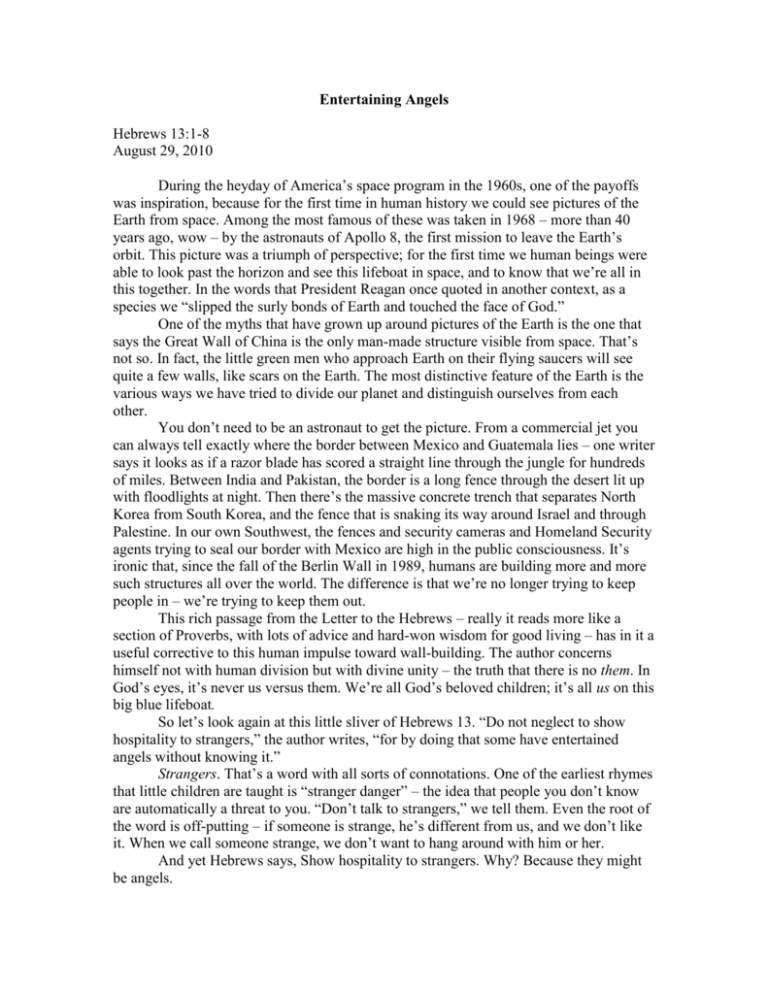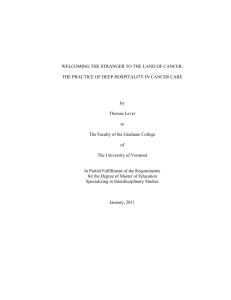Entertaining Angels
advertisement

Entertaining Angels Hebrews 13:1-8 August 29, 2010 During the heyday of America’s space program in the 1960s, one of the payoffs was inspiration, because for the first time in human history we could see pictures of the Earth from space. Among the most famous of these was taken in 1968 – more than 40 years ago, wow – by the astronauts of Apollo 8, the first mission to leave the Earth’s orbit. This picture was a triumph of perspective; for the first time we human beings were able to look past the horizon and see this lifeboat in space, and to know that we’re all in this together. In the words that President Reagan once quoted in another context, as a species we “slipped the surly bonds of Earth and touched the face of God.” One of the myths that have grown up around pictures of the Earth is the one that says the Great Wall of China is the only man-made structure visible from space. That’s not so. In fact, the little green men who approach Earth on their flying saucers will see quite a few walls, like scars on the Earth. The most distinctive feature of the Earth is the various ways we have tried to divide our planet and distinguish ourselves from each other. You don’t need to be an astronaut to get the picture. From a commercial jet you can always tell exactly where the border between Mexico and Guatemala lies – one writer says it looks as if a razor blade has scored a straight line through the jungle for hundreds of miles. Between India and Pakistan, the border is a long fence through the desert lit up with floodlights at night. Then there’s the massive concrete trench that separates North Korea from South Korea, and the fence that is snaking its way around Israel and through Palestine. In our own Southwest, the fences and security cameras and Homeland Security agents trying to seal our border with Mexico are high in the public consciousness. It’s ironic that, since the fall of the Berlin Wall in 1989, humans are building more and more such structures all over the world. The difference is that we’re no longer trying to keep people in – we’re trying to keep them out. This rich passage from the Letter to the Hebrews – really it reads more like a section of Proverbs, with lots of advice and hard-won wisdom for good living – has in it a useful corrective to this human impulse toward wall-building. The author concerns himself not with human division but with divine unity – the truth that there is no them. In God’s eyes, it’s never us versus them. We’re all God’s beloved children; it’s all us on this big blue lifeboat. So let’s look again at this little sliver of Hebrews 13. “Do not neglect to show hospitality to strangers,” the author writes, “for by doing that some have entertained angels without knowing it.” Strangers. That’s a word with all sorts of connotations. One of the earliest rhymes that little children are taught is “stranger danger” – the idea that people you don’t know are automatically a threat to you. “Don’t talk to strangers,” we tell them. Even the root of the word is off-putting – if someone is strange, he’s different from us, and we don’t like it. When we call someone strange, we don’t want to hang around with him or her. And yet Hebrews says, Show hospitality to strangers. Why? Because they might be angels. Here the writer is looking back at some wonderful angel stories in the Old Testament. In Genesis 18, for example, the patriarch Abraham is trying to keep cool in his tent when three men show up; Abraham gives them food and water, and lets them wash their feet and sit in the shade for a while. He does this out of a sense of hospitality, and he’s surprised when it turns out that they are divine beings. They’re the ones who tell him that his wife, Sarah, will bear a child in her old age. And so it was. (Abraham’s hospitality is part of his legend. When Muslims end their holy fast of Ramadan, they do it with a big feast called the Tent of Abraham. Locally they did this Thursday at the Islamic Center on Heim Road, and they invited Christian churches and Jewish synagogues to join them. A lesson in hospitality there.) There are other stories like this: Lot shows hospitality to two men who turn out to be angels; Gideon unknowingly entertains an angel in the Book of Judges; Samson’s parents provide hospitality to an angel. And so for the earliest readers of Hebrews, this advice about taking care of strangers because they might be angels, this is familiar advice. It has happened before. Do not neglect to show hospitality to strangers. It’s good advice, for a couple of reasons. The first is the Wilford Brimley reason: It’s the right thing to do. Again and again in the Bible, and especially in the stories of Jesus and the way he broke all sorts of social and cultural and religious barriers, we have this lesson: There is no them. If we’re supposed to be about building the kingdom of God, that’s what it looks like: a radical welcome, an appreciation and affirmation of every human being as a child of God. So exercising hospitality is a way of living in that holy kingdom right now. There’s no need to wait till we get to heaven. We can build that kind of openness and welcome into our lives and get a taste of the kingdom. It tastes good. But there’s another reason to show hospitality to strangers, and that is that it’s in our self-interest. After all, wouldn’t it be interesting to meet an angel? That’s the promise here. When you don’t feel like taking the time to get to know someone, or you’re tempted to wall yourself off from a stranger, someone strange and different from you, this passage suggests that it’s in your own interest to connect with that person – to be a generous and welcoming presence in their life. To be Christ for that person. There’s a Buddhist proverb that has been going around in my mind ever since I first read it. It says this: “Treat everyone you meet as enlightened.” That is, look at each person who comes into your life, stranger or familiar, and say to yourself, This person knows something that I don’t. What does God want me to learn here? That attitude is perfectly consistent with Christian doctrine, because we know that the spirit of Christ lives in each person. To approach each person with a questioning and appreciative heart is to recognize that the Christ in you calls to and responds to the Christ in them. So try bringing that attitude to every encounter this week and see how it feels. What does, say, the reckless driver who just cut you off have to teach you? The crying baby in the supermarket? The bearded guy with a shopping cart full of returnable bottles? That troublesome relative? The friend in trouble? You may not be able to put into words what their enlightenment consists of. What you learn from them, you may not be able to write down. But by recognizing that person as a fellow child of God, with wisdom and enlightenment all their own, you change and grow. You start to build your own muscles for affirming and accepting those around you. Even strangers. Even the strange. You become that hospitable person whom God is calling you to be. Henri Nouwen, the great Catholic priest and spiritual writer, talks about why this kind of hospitality is important on a grander scale, and I want to close with his thoughts. Henri Nouwen says this: “Beneath all the great accomplishments of our time, there is a deep current of despair. While efficiency and control are the great aspirations of our society, the loneliness, isolation, lack of friendship and intimacy, broken relationships, boredom, feelings of emptiness and depression, and a deep sense of uselessness fill the hearts of millions of people in our success-oriented world.” So what do we, as Christians, do about this? For Nouwen, the answer starts with a definition of love. There’s “God’s first love,” he says, a love that is “without any conditions or limits.” Then there’s the “second love,” which is the love of human beings. This love, he says, is “limited, broken and very fragile.” It’s not something we can build our lives on. And so the church’s job, he says, is to proclaim the gospel message: “The radical good news is that the second love is only a broken reflection of the first love and that the first love is offered to us by a God in whom there are no shadows.” That first love is always there, and it sets a place at the table for each and every one of God’s precious children. And so when we set that table, we need to remember that we are not the hosts. God is the host, the God who loves us all, the God who invites each of us to the feast. May it be so. Amen.








